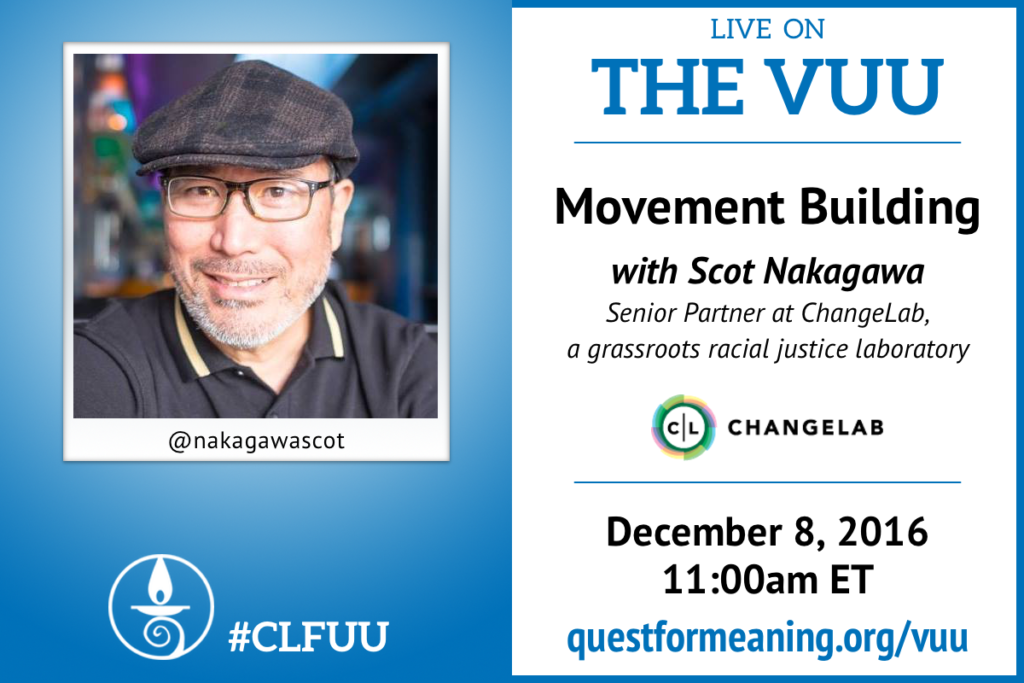162: Movement Building
December 8, 2016Podcast: Download (Duration: 1:00:42 — 55.6MB)
Subscribe: More

In this episode, Scot Nakagawa talks about how storytelling has been effectively used by conservatives and the religious right to move power. He goes deep into explaining why all politics is identity politics. He talks about the need to build both the popular front and the united front.
Scot is a senior partner with ChangeLab, a grassroots racial justice laboratory. He’s a long-time activist, community organizer and provocative thinker.
The VUU is hosted by Meg Riley, Joanna Fontaine Crawford, Aisha Hauser, Hank Peirce, and Alicia Forde, with production support provided by Terri Burnor. The VUU streams live on Thursdays at 11 am ET. This episode aired on December 8, 2016.
Note: The audio above has been slightly edited for a better listening experience. View the live original recording on YouTube.
Let your anger guide you to beloved action: Join me in Ferguson
July 30, 2015I’m angry. I’m not even sure that’s a big enough word for what I’m feeling. The rage is deep, so pervasive at times it threatens to paralyze me into inaction. I struggle against the threat of being rendered immobile by this anger every day.
This week, I braced myself for the release of another video of a heinous police shooting of an unarmed black man, this time in Cincinnati, Ohio. I must fight with every fiber of my being to stay in my body, to stay connected to my feelings and ground myself, bracing for another wave of grief and pain that feeds my deeper rage.
That’s why on August 7-10, I am responding to the call of leaders in Ferguson to show up and take collective action for racial justice on the anniversary of the Ferguson uprising. Read more →
Crying Together
June 18, 2015Maybe we could just sit down and cry together first. In the presence of Black rage. In the presence of white  shame. In the presence of grief and despair and the overwhelming knowledge that white men with guns just keep killing people. In the devastating remembrance that this is not the first time that a white man with a gun has chosen a place of worship as the most devastating possible place to exact horrific violence.
shame. In the presence of grief and despair and the overwhelming knowledge that white men with guns just keep killing people. In the devastating remembrance that this is not the first time that a white man with a gun has chosen a place of worship as the most devastating possible place to exact horrific violence.
We need to say out loud that this was another act of violent white supremacy, not just a disturbed individual. It matters that we point out that, as with almost every instance of mass violence, it was a man who committed this atrocity, with a man’s sense of entitlement to assert his will at whatever cost to those around him. We need to say out loud that once again gun violence has cost innocent people their lives, that while a man bent on doing damage with a knife can certainly hurt people, guns kill people far more rapidly and efficiently than anything else.
And then we need to sit with the fact that this horrific act was committed in a church. That it wasn’t random that the killer chose the AME church that has been such a force for Black empowerment and leadership development. That it wasn’t random that violence was perpetrated in a temple of peace. That this man sat and prayed with his victims for an hour before he attacked, and God did nothing to stop him. That the only way that God will ever stop the violence—not just the brutality of mass shootings, but also the daily violence of racism in all its massive and tiny iterations—is if we are committed, individually and collectively, to being God’s voice, God’s hands, God’s pain and rage, God’s impulse toward love and justice.
There is so much to be done, so many rents in the fabric of our common life that we can only hope are possible to stitch or patch together. There is so much that each of us is called to do. But maybe first we could just sit down together for a little while and cry.
About
Quest for Meaning is a program of the Church of the Larger Fellowship (CLF).
As a Unitarian Universalist congregation with no geographical boundary, the CLF creates global spiritual community, rooted in profound love, which cultivates wonder, imagination, and the courage to act.
Contact
Church of the Larger Fellowship Unitarian Universalist (CLFUU)
24 Farnsworth Street
Boston MA 02210

